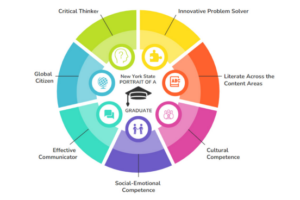Regents requirement could be dropped
State education leaders on Monday (Nov. 4) presented a timeline and implementation plan for establishing multiple pathways to earning a high school diploma while reducing reliance on standardized tests.
The plan, introduced by Education Department officials to the Board of Regents in Albany, would be phased in over five years and is based on the work of the Blue Ribbon Commission on Graduation Measures, a 64-person committee that began studying equity in schools in 2019.
If the Regents approve the plan, it would implement four policy “transformations,” including, by the fall of 2027, dropping the requirement that students pass Regents exams in math, English, science and social studies to graduate. The exams would still be offered because of federal requirements but would become one of several options for students to demonstrate proficiency.
The other transformations include adopting a state “portrait of a graduate,” redefining the credits students earn to focus on proficiency and shifting to one standard diploma but noting distinctions with seals.

The portrait of a graduate identifies seven skills, including being a global citizen and displaying social-emotional competence, that educators believe are necessary to becoming a “college-, career- and civic-ready graduate.” Seventeen states use similar models.
Students’ options for demonstrating proficiency in a subject would be expanded from traditional assessments to include more project-based options such as internships and “real-world” work experience. Graduation requirements would also grow to incorporate performance-based assessments and no longer depend on test scores.
Finally, the state would shift from offering three types of diplomas (local, Regents and Regents with advanced designations) to one. Seals noting special designations, such as biliteracy or civic readiness, could still be applied.
The proposals will continue to be honed over the next year.
“We want there to still be rigor, but at the same time, we know our students have multiple talents,” said Sagrario Rudecindo-O’Neill, the assistant superintendent of curriculum and student support for the Beacon district, who chaired a Blue Ribbon Commission subcommittee. “We asked, ‘What can we do in addition so we’re not penalizing students who are not test-takers but know how to apply the knowledge that they’ve been given?’ The point is looking at success differently.”
The Regents board has not approved the plan but appears to be in favor of it. In a statement on Monday, Lester Young Jr., its chancellor, called the changes essential for ensuring that students, “no matter their background or circumstances, receive high-quality instruction that equips them for success in a complex and rapidly evolving world.”
The plan is to continue holding forums and advisory panels before releasing specific, reformatted learning standards to educators next fall. By the fall of 2027, the state would move to one diploma for all students and begin expanding the system through which students earn credits.
The four transformations would be executed by the fall of 2029. As envisioned, the first class that could graduate under the new standards would be the Class of 2033, or today’s fourth graders.
The changes provide “multiple pathways for students to demonstrate they’ve acquired the skills and abilities that we’ve asked them to,” said Jodi DeLucia, the deputy superintendent of the Dutchess Board of Cooperative Educational Services (BOCES), who helped facilitate an information session last month at Beacon High School. “Instead of everything being about seat time,” or the amount of time students spend in class, “it becomes about proficiency.”

